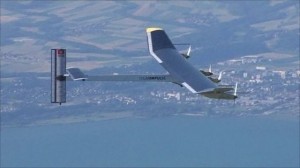Special to WorldTribune.com
LONDON — Morocco has been promoting the development of a solar
power aircraft.
Morocco has agreed to host the first flight of a solar aircraft from
Europe to North Africa. Organizers said the airplane, called Solar Impulse
and developed by Bertrand Piccard and Andre Borschberg, would fly 2,500
kilometers from Spain to Morocco without using fuel.

“We didn’t have a moment’s hesitation in accepting the idea of working with Morocco,” Borschberg, chief executive officer of Solar Impulse, said. “This destination corresponds fully with the goals we had set ourselves in terms of distance and flight duration.”
Solar Impulse, with the wingspan of an Airbus A-340, contains 12,000 solar cells and four 10 horsepower electric motors. The carbon fiber aircraft, developed over seven years, conducted its first flight in 2011 — from Paris to Brussels.
Organizers said the flight to Morocco would take place in May or June 2012. They said the flight would take 48 hours with a stopover near Madrid to change pilots. Solar Impulse, with the ability to recharge its 400 kilogram lithium batteries during the day, was capable of night flight.
“This long-duration flight will serve as a dress rehearsal for the
round-the-world flight in 2014,” Solar Impulse said on April 16. “It will
allow the mission team to gather additional experience in cooperating with
international airports, integrating the prototype into regular air traffic
patterns, and managing the logistics of maintenance.”
The Moroccan Agency for Solar Energy, known as MASEN, has promoted the
aircraft project as part of the kingdom’s campaign to develop solar energy.
Morocco plans to launch construction of the largest solar power plant in the
world in the Ouarzazate region near the Sahara Desert.
By 2020, Morocco intends to build five solar facilities that would
generate a total of 2,000 megawatts. The plant in Ouarzazate would contain
an initial capacity for 160 megawatts, increasing to 500 megawatts by 2015.
“It is quite natural, given the convergence between our respective
convictions and goals, that Solar Impulse and MASEN combine forces for a
project that brings to life the ideals and values that inspire us,” agency
chairman Mustapha Bakkoury said.
Meanwhile, Libya has been examining the prospect of aerospace
cooperation with Morocco.
Officials said the two North African states have been discussing
Moroccan assistance to develop Libya’s aerospace industry. They said
aerospace could be one of several areas of cooperation between Libya and
Morocco in wake of the ouster of Col. Moammar Gadhafi in 2011.
“The kingdom capitalized on a number of industrial activities, including
aeronautics, auto industry, textile and food-processing industry, in which
Libyans are interested,” Moroccan Industry and Trade Minister Abdul Khader
Amara said.
Until 2011, Italy was contracted to build Libya’s aerospace and defense
industry. Italy’s Finmeccanica helped establish a joint venture meant to
maintain and produce helicopters and components.
On April 6, Amara hosted his Libyan counterpart, Mahmoud Fetais, in
Rabat. Officials said the two ministers focused on joint industrial projects
in which Morocco could provide technical assistance.
“We are examining options to establish an effective partnership likely
to lay the groundwork for industrial complementarity between Libya and
Morocco as well as among all the Maghreb countries,” Fetais said.

You must be logged in to post a comment Login